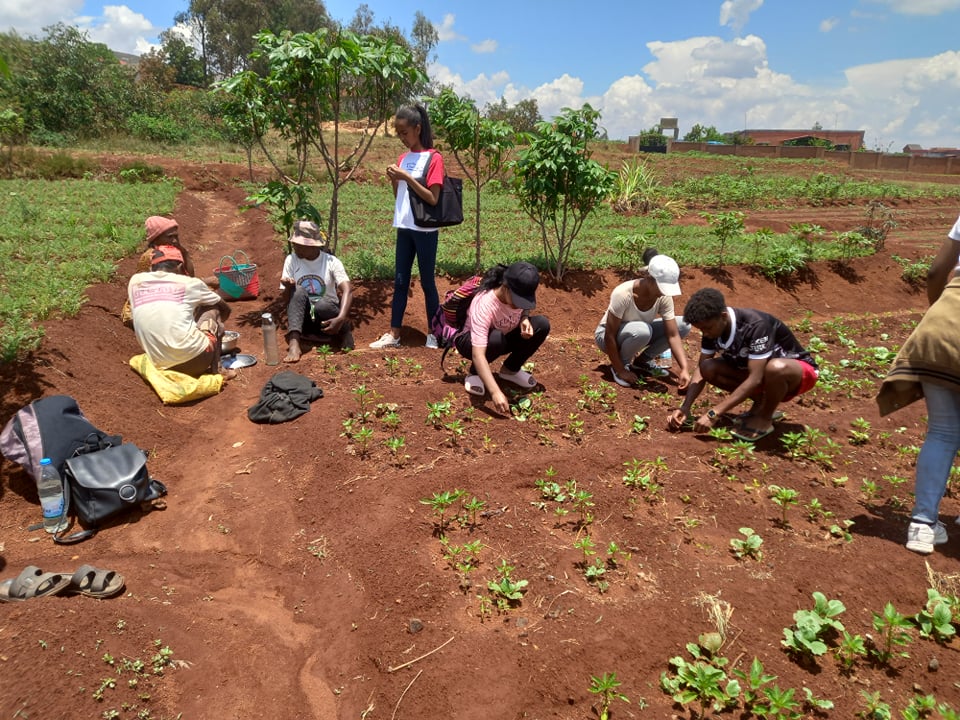"Penser globale, agir national", telle est la ligne conductrice qui portera toute la politique et les actions de l’Université.
Joindre
L’employabilité de nos étudiants devient nos préoccupations. Les offres de formation sont accréditées aux besoins de la société.
Joindre
Les Écoles Doctorales et les laboratoires encadrent des doctorants et de chercheurs aptes à la création d’emploi
Joindre
At the University of Antananarivo, the COMMO program trains future communication professionals. From the Bachelor’s to the Master’s level, it places great importance on local development and the integration of students into their environment. As soon as they enter their first year, the new students are out in the field for three days to meet the users of the Ankatso Campus, the urban population of the capital Antananarivo, as well as that of a village. On November 17, a group of students was in the rural commune of Masindray, about 20 kilometers from Antananarivo.
"The contact of students with the realities of the rural environment and the observation of individuals in communication situations are essential elements for the successful completion of the university curriculum of students in L1 of the Mention COMMO", says Dr. Lanto Rasoanilana, head of the Mention, "three kinds of field activities allow students to enter the university world and especially to have a glimpse of the stakes of training in communication : the university campus, the city and neighbourhood, and the village."

Caption : The visit to the village of Masindray allowed us to observe communication practices in rural areas.
The COMMO, Communication Mediation Media and Organization, trains future communication professionals at the University of Antananarivo. It is the equivalent of Information-Communication at the University of La Réunion. In the Bachelor’s and Master’s programs, human sciences play an important role, as do local development and knowledge of the realities of the Malagasy population. This is why, as soon as they enter the University, the new students are out in the field for three days : first at the Ankatso University Campus, then the next day in the urban areas of Antananarivo, and finally in a village.
From the outset in a position of researchers
Les plus de 200 étudiants en première année étaient répartis ce 17 novembre dans cinq villages : Namehana, Belanitra, Antananandrano, Manandriana et Masindray. Seul le nom leur était donné, à charge pour eux de trouver le village et de s’y rendre par leurs propres moyens.
Relié par bus suburbain à Antananarivo, Masindray offre un contraste saisissant avec le centre de la capitale. Ce village est une commune rurale vaste de plusieurs kilomètres carrés, composée de 11 fokontany, mais avec une seule école publique, l’EPP. C’est dans cet EPP que les élèves avaient donné rendez-vous aux enseignants venus les rencontrer peu après le repas de midi.
Le contraste est également saisissant avec le lycée. Dès cette première activité pédagogique, les primo-étudiants sont d’emblée placés dans une position de chercheur, avec comme mission d’observer, de collecter des informations relatives aux pratiques de communication, et d’identifier les différences et les convergences avec les deux autres environnements précédemment étudiés : le campus et la ville.
Mettre des mots sur des pratiques
In Masindray, the students were divided into several groups of a maximum of 8 people. Each group then reported their observations to Dr Lanto Rasoanilana and Manuel Marchal, a journalism instructor. They mentioned the existence of specific prohibitions in this village : no goats, only one species of pig tolerated in particular. They also mentioned a place called Imerina-masina, in connection with the coming of King Andrianampoinimerina. Andrianampoinimerina was the sovereign who launched the idea of the unification of Madagascar.
They also explained how they participated in the daily activities of the village, including working the land. They also noted the low rate of schooling in the village, due to the lack of schools, resulting in a lower literacy rate than in the city. This requires appropriate communication from the authorities, with the use of images.
Importance of the humanities
This pedagogical sequence illustrates a specificity of the training of future communication professionals at the University of Antananarivo : contact with the field. Indeed, many of them are destined to work in the field of local development. This implies that they must be well acquainted with the realities of the Malagasy people. To support this fieldwork, an important place is given to the human sciences : anthropology, sociology, psychology, culture and society are important disciplines in the COMMO curriculum..
Manuel Marchal
Choisir une formation qui vous convient, c'est penser déjà à votre carrière envisagé. Notre module d'orientation vous expose un test d'orientation, une liste de 1100 métiers, et une liste de 250 formations
Le personnel enseignant, administratif et technique est disponible pour vous offrir les meilleurs conseils d'orientation
Le savoir est offert par l'Université. Le savoir faire s'acquiert par l'expérience. Le savoir être dépend de votre personnalité.